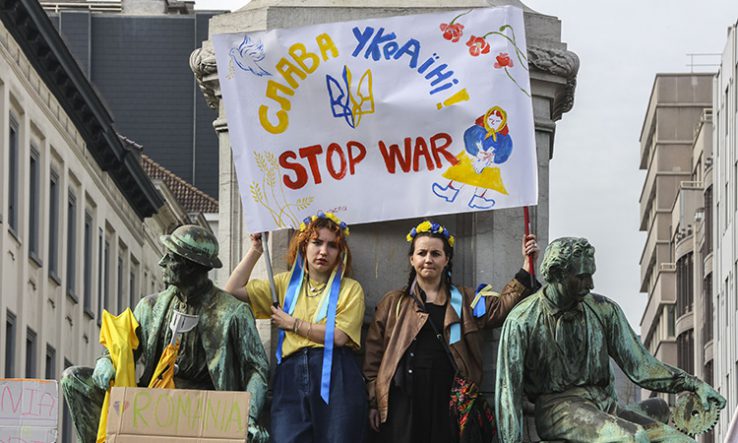
Image: European Union 2022
Plea comes as national academies in Russia and Belarus are suspended from European umbrella group
A global academy of early career researchers has pleaded for academic institutions around the world to maintain collaborations with Russian academics, as the war in Ukraine continues.
The plea came as the European umbrella group of national academies of sciences and humanities, Allea, suspended its Russian and Belarusian members as a signal of the “moral outrage of the academic community” over the Russian invasion of Ukraine, which the Belarusian government has supported politically and militarily.
Other European organisations had already cut ties to Russian government and academic institutions, including new collaborations via the EU R&D programme, but many have expressed support for Russian researchers speaking out against the war and some have stopped short of severing all links to Russia.
Drawing the line
On 4 March, the Global Young Academy, which is made up of early career researchers from around the world, released a statement saying: “We must not let war divide us and so we stand committed to advocating for continued cooperation with and between the Ukrainian and Russian scholars.”
The Academy called on “all universities, institutes, and academic institutions around the world…to uphold scientific collaborations with Russian scholars” as well as open their doors to Ukrainian colleagues.
In doing so, it helped to clarify which global ties to Russian academia are likely to be retained, amid a plethora of statements from academic organisations announcing the severing of some relations while expressing support for individual Russian academics who speak out against the invasion.
On the same day, the governing board of Allea, which has more than 50 member academies across Europe, said it had suspended the Russian Academy of Sciences and the National Academy of Sciences of Belarus, “in line with international sanctions against institutions in the two states”.
Allea said the move “might have an unintended impact on individual scientists and international scientific collaboration” but that “the ability of these academies to act autonomously and independently from their governments has come into question”.
It added: “Allea also recognises with admiration and support the courage of the Russian and Belarusian scholars, including fellows from the suspended academies, who have spoken out against the criminal actions of governments at great risk to their physical and professional security.”
Support for Russian opposition
Yesterday the researcher association EuroScience called on its members “to distinguish clearly between the lives and accomplishments of colleagues working in the Russian Federation and the inexcusable military action and policies of the Russian government”.
Similarly, the Cesaer association of European universities said: “We also commend the bravery of Russian academics…who are expressing their opposition to war.”
A day earlier, the European University Association called on its members to “ensure on a case-by-case basis that the continuation of existing collaborations is appropriate”, as it announced that it was ceasing collaboration with Russian government agencies and said it would “reiterate to the leaders of Russian members of EUA […] core European values”.
Also on 2 March, Ghent University’s Russia Platform, which works on cooperation with Russia for education and research, said that “keeping open the channels for communication with Ukrainian and Russian academics and civil society is essential”, while adding that it would “re-evaluate our existing cooperations with academic institutions in Russia”.
Adding to an earlier letter from senior Russian academics, on 28 February Russian mathematicians published an open letter to Vladimir Putin protesting their country’s invasion of Ukraine and lamenting the impact military action would have on Russian leadership in mathematics.
“In a situation where our country has become a military aggressor and, as a result, a rogue state, Russia’s leadership positions in world mathematics will be irretrievably lost,” the mathematicians wrote.